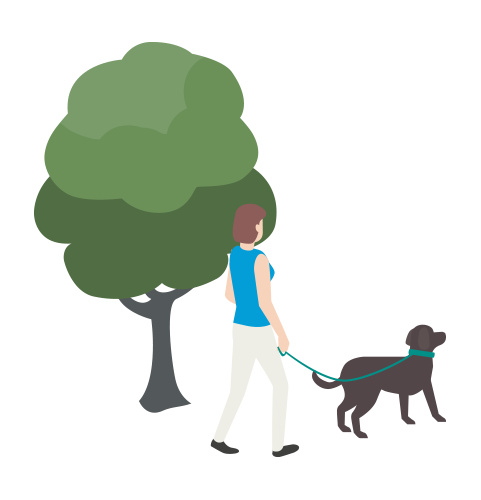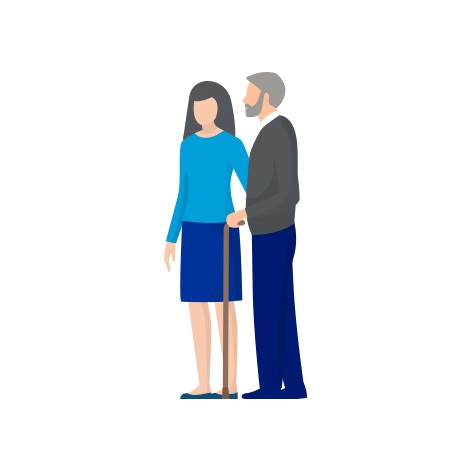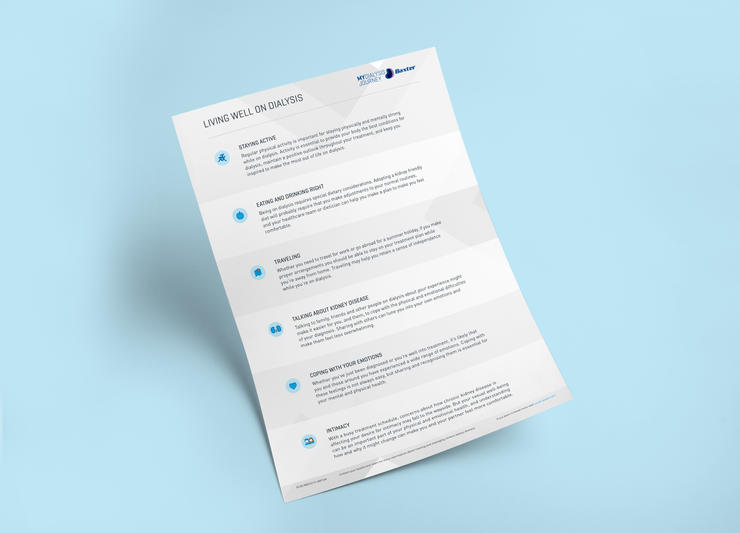Living with Dialysis
Taking care of your mental and physical health throughout your time on dialysis will ensure that you're getting the most out of treatment and help you continue leading a fulfilling life while on dialysis.
Many aspects of your life may be impacted while you're on dialysis. Caring for your body and mind will help you cope with the demands of treatment and enjoy activities you loved before your chronic kidney disease (CKD) diagnosis. Although you may not feel up to it at first, as you go further into your journey, you may find that being physically and emotionally healthy can allow you to take a more active role in your treatment. It may even help you retain a sense of normalcy despite of the big life changes you’re experiencing.
Living with dialysis
Diet for dialysis patients
Exercise for dialysis patients
Travelling on dialysis
Talking about dialysis
Mental health and kidney disease
Sexuality and kidney disease

Diet for dialysis patients
Being on dialysis requires special dietary considerations. Knowing what you should and should not eat while on dialysis and adhering to this will help keep your body in balance. Adopting a kidney-friendly diet will probably require adjustments to your normal routine. Your clinician or dietician can help you make a plan that you feel comfortable with.

Exercise for dialysis patients
Regular physical activity is important for staying physically and mentally strong while you're on dialysis. Sticking to an exercise plan that you enjoy may help lower your cholesterol, keep your weight controlled, reduce stress and anxiety and improve your heart health, among many other potential benefits. Staying active may also keep you mentally stimulated, allowing you to maintain a more positive outlook throughout your treatment journey and feel inspired to make the most of your life living with dialysis.

Travelling on dialysis
Whether you need to travel for work or go abroad for a summer holiday, if you make the proper arrangements, you should be able to continue travelling while on dialysis. This is especially true if you're on peritoneal dialysis (PD). Travelling may boost your mood and help you retain a sense of independence while you're on dialysis.

Talking about dialysis
Talking to family, friends and other people on dialysis about your experience living with chronic kidney disease (CKD) may make it easier for you, and them, to cope with the physical and emotional difficulties of your diagnosis. Sharing with others can help you understand your own emotions, making them feel less overwhelming and you feeling more in control. The support and advice of your loved ones may help you gain a new and valuable perspective on what you're experiencing.

Mental health and kidney disease
Adjusting to life with a chronic condition can be a challenging process. Whether you have just been diagnosed or are well into treatment, it’s likely that you and those around you have experienced a wide range of emotions. Coping with these feelings is not easy but sharing and recognising them is essential to preserve your mental and physical health while living with dialysis.

Sexuality and kidney disease
With a busy treatment schedule, concerns about how chronic kidney disease (CKD) is affecting your desire for sex may fall to the wayside. But your sexual well-being is an important part of your physical and emotional health while living with dialysis. Understanding how and why your sexual life can change as a result of your condition may make you and your partner feel more comfortable.
